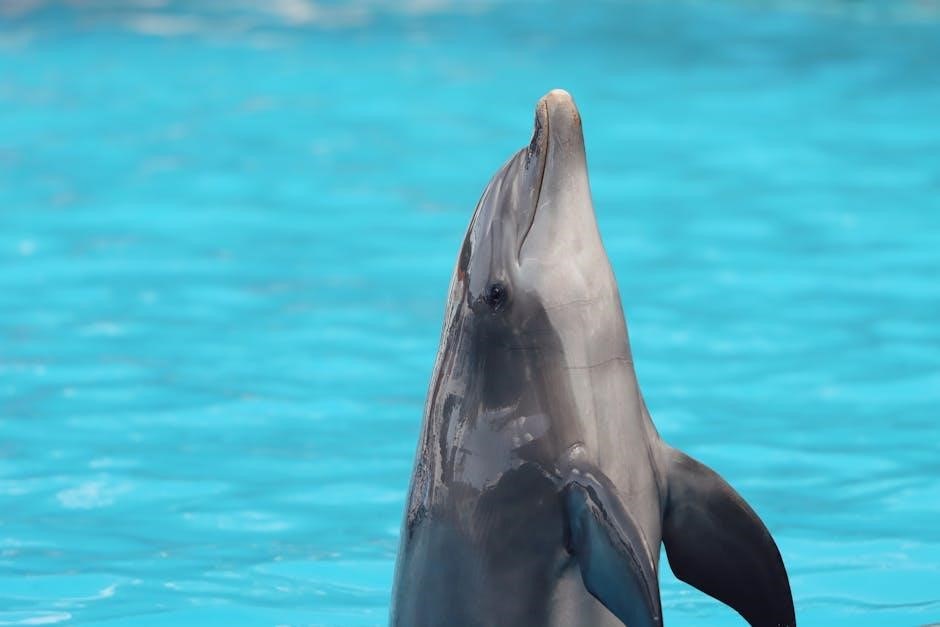The ICCAT Resolution Dolphin PDF introduces conservation measures,
- including
vessel sightings and reporting, to protect dolphins and tuna species, with regular meetings and scientific evidence-based decisions․
Overview of ICCAT and its Objectives
The International Commission for the Conservation of Atlantic Tunas (ICCAT) is an intergovernmental organization responsible for the conservation of tuna and tuna-like species in the Atlantic Ocean․ The main objectives of ICCAT are to ensure the long-term conservation and sustainable use of these species, as well as to promote cooperation among its member countries․ ICCAT achieves these objectives through the adoption of resolutions and recommendations, which are based on scientific research and evidence․ The organization also works to improve compliance and cooperation among its members, and to address issues such as overfishing and bycatch․ By working together, ICCAT member countries can help to ensure the health and sustainability of tuna and tuna-like species in the Atlantic Ocean, which is essential for the livelihoods of people who depend on these species․ ICCAT’s work is guided by its convention and is supported by its scientific committee․

History of ICCAT Resolutions
ICCAT resolutions have evolved over time, with key developments in conservation and management of tuna species, shaping the organization’s approach to sustainable fishing practices and compliance․
Key Resolutions and Recommendations
The International Commission for the Conservation of Atlantic Tunas (ICCAT) has adopted several key resolutions and recommendations to promote sustainable fishing practices and conservation of tuna species․ These include resolutions on catch documentation schemes, electronic monitoring systems, and labor standards in fisheries․ The ICCAT has also established recommendations for aquaculture and bluefin tuna, as well as guidelines for the development of operational management objectives for southern Atlantic albacore․ Additionally, the organization has implemented measures to address trans-shipments in high seas and improve compliance and cooperation within the Convention․ The ICCAT’s Scientific Committee on Research and Statistics (SCRS) provides scientific evidence to inform these decisions, ensuring that conservation efforts are based on the best available data and research․ By adopting these resolutions and recommendations, the ICCAT aims to promote sustainable and responsible fishing practices in the Atlantic Ocean․ Regular meetings and reviews help to ensure their effectiveness․
ICCAT Working Groups and Electronic Monitoring Systems
ICCAT establishes working groups and implements electronic monitoring systems to enhance fisheries management and compliance․
Establishment of Working Groups and EMS
The International Commission for the Conservation of Atlantic Tunas (ICCAT) has established various! working groups to address specific issues related to fisheries management, including the use of electronic monitoring systems (EMS)․ These working groups are composed of experts from member countries and are responsible for providing recommendations to the Commission on matters such as catch documentation, vessel monitoring, and compliance․ The establishment of EMS is a key component of ICCAT’s efforts to improve the management of fisheries and reduce the risk of overfishing․ By using EMS, ICCAT can monitor fishing activities in real-time, track vessel movements, and detect any suspicious activity․ This information can then be used to inform management decisions and ensure that fisheries are being managed sustainably․ The use of EMS is an important step forward in ICCAT’s efforts to protect marine ecosystems and promote responsible fishing practices․

Addressing Labor Standards in ICCAT Fisheries
ICCAT establishes a process to address labor standards in fisheries, ensuring fair treatment of workers, with regular monitoring and reporting, using
- specific
guidelines and protocols․
Process to Address Labor Standards
The process to address labor standards in ICCAT fisheries involves establishing a set of guidelines and protocols to ensure fair treatment of workers․ This includes regular monitoring and reporting of labor practices, as well as the development of
- specific
standards for working conditions, wages, and social benefits․ The ICCAT Commission works with its members to implement these standards and provide technical assistance to countries that need it․ The process also involves collaboration with other international organizations, such as the International Labor Organization, to share best practices and expertise․ By addressing labor standards, ICCAT aims to promote sustainable and responsible fishing practices that benefit both the environment and the people involved in the industry․ This approach is essential for ensuring that the fishing industry is socially responsible and contributes to the well-being of communities․

ICCAT Recommendations on Aquaculture and Bluefin Tuna
ICCAT issues recommendations on aquaculture and bluefin tuna to promote
- sustainable
fishing practices and conservation․
Recommendations for Sustainable Fishing Practices
The International Commission for the Conservation of Atlantic Tunas provides recommendations for sustainable fishing practices, including the use of electronic monitoring systems and catch documentation schemes to reduce bycatch and protect marine ecosystems․ The commission also recommends the implementation of conservation measures such as closed seasons and closed areas to protect vulnerable species․ Additionally, the commission promotes the use of sustainable fishing gear and practices, such as pole and line fishing, to reduce the impact of fishing on the environment․ The commission’s recommendations are based on scientific research and are designed to promote the long-term sustainability of tuna and other marine species․ The recommendations are implemented through a combination of national and international efforts, including the development of national plans of action and the implementation of international agreements․ The commission’s work is supported by a range of stakeholders, including governments, industry, and conservation organizations․

Development of Operational Management Objectives
ICCAT develops operational management objectives, including conservation measures, to ensure sustainable fishing practices and protect marine ecosystems effectively always․
Objectives for Southern Atlantic Albacore
The International Commission for the Conservation of Atlantic Tunas (ICCAT) has established objectives for the conservation and management of southern Atlantic albacore, a species of tuna found in the Atlantic Ocean․ These objectives aim to ensure the long-term sustainability of the species, while also providing for the needs of fishermen and other stakeholders․ The objectives include reducing the catch of juvenile albacore, protecting critical habitats, and promoting eco-labeling and certification of sustainably caught albacore․ ICCAT has also established a rebuilding plan for Mediterranean albacore, which includes measures to reduce fishing effort and protect spawning areas; The commission works with its members and other organizations to implement these objectives and ensure the effective conservation and management of southern Atlantic albacore․ By working together, ICCAT and its partners can help to ensure the long-term health of this important species and the ecosystems it inhabits, with regular meetings and scientific evidence-based decisions always considered․
Compliance and Cooperation within the Convention
ICCAT ensures compliance through regular reporting and
- monitoring
of member states’ activities always․
Resolution 16-17 and its Impact on Compliance
Resolution 16-17 is a key component of ICCAT’s compliance strategy, aiming to improve cooperation among member states․ The resolution establishes a schedule of action to enhance compliance, setting a higher standard for other tuna RFMOs․ According to the resolution, member states are required to report vessels sightings and take action against non-compliant vessels․ The resolution also emphasizes the importance of cooperation and information sharing among member states to prevent illegal fishing activities․ By implementing Resolution 16-17, ICCAT aims to reduce the risk of non-compliance and promote sustainable fishing practices․ The resolution’s impact on compliance is significant, as it provides a framework for member states to work together to address common challenges and ensure the long-term conservation of tuna species․ Overall, Resolution 16-17 is an essential tool for promoting compliance and cooperation within the ICCAT framework․
